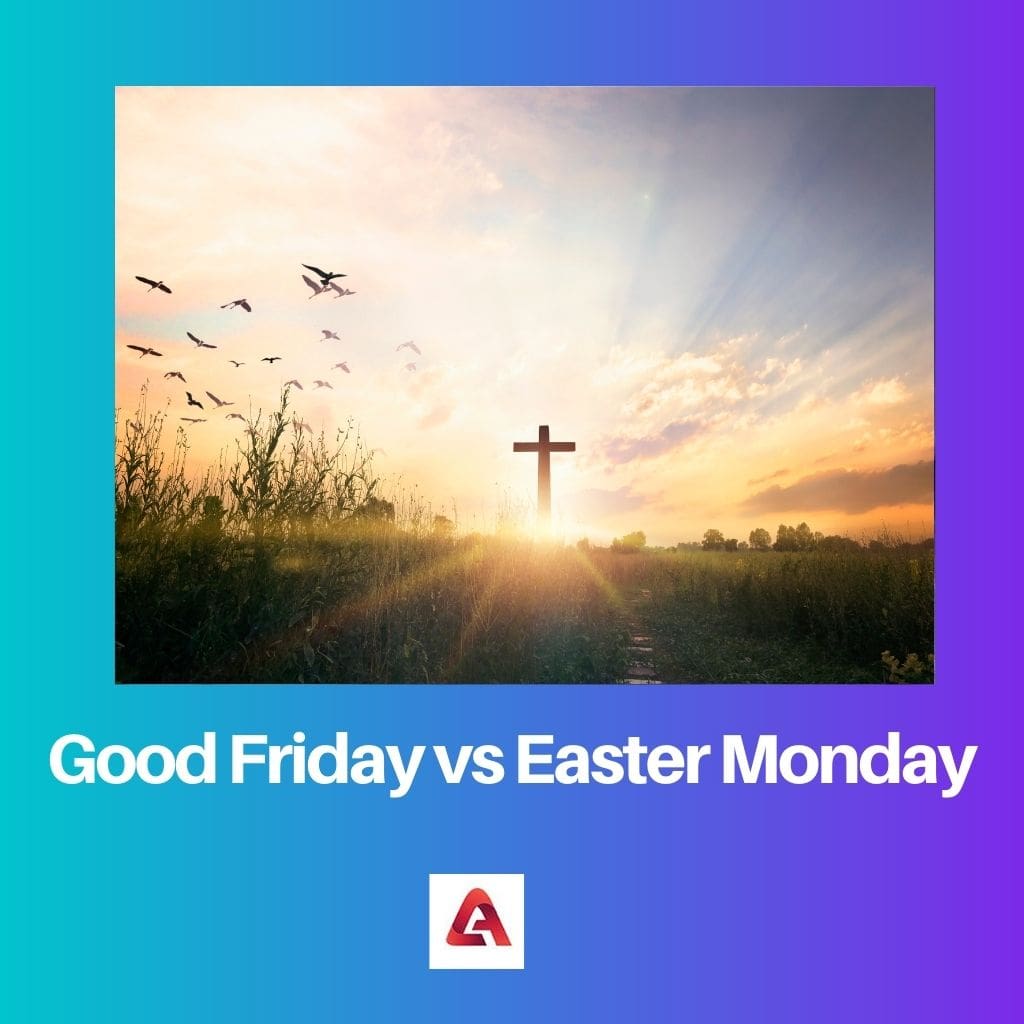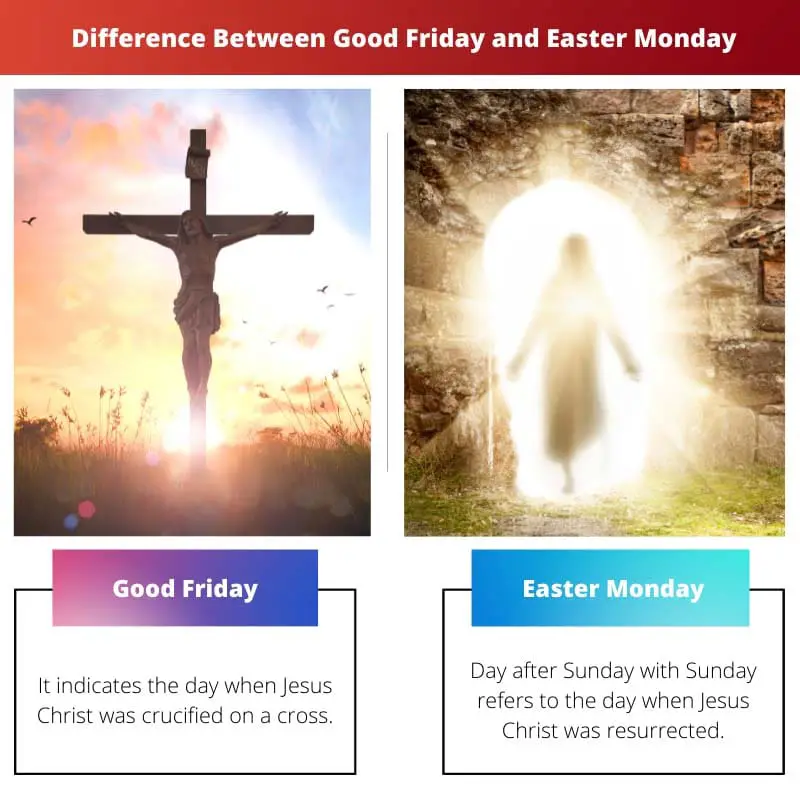Good Friday commemorates the crucifixion of Jesus Christ, observed as a solemn day of reflection and mourning. Easter Monday follows Easter Sunday, celebrating the resurrection with a day off in some cultures, symbolizing hope and new beginnings. Both days are significant in the Christian calendar, marking key events in the Easter story.
Key Takeaways
- Good Friday commemorates the crucifixion of Jesus Christ, while Easter Monday marks the day after Easter Sunday, celebrating Jesus’ resurrection.
- Good Friday is a solemn day of mourning and reflection, with many Christians attending church services, while Easter Monday is a day of joy and celebration.
- Good Friday and Easter Monday are observed by Christians worldwide and are recognized as public holidays in countries with Christian traditions.
Good Friday vs Easter Monday
The difference between Good Friday and Easter Monday is that on Good Friday, Jesus Christ was crucified on the cross, while on Easter Sunday (Easter Monday is the day after Easter Sunday), he was resurrected, i.e. Jesus Christ came back to life.

However, the above is not the only difference. A comparison between both the terms on certain parameters can shed light on subtle aspects:
Comparison Table
| Feature | Good Friday | Easter Monday |
|---|---|---|
| Religious Significance | Commemorates the crucifixion of Jesus Christ | Celebrates the resurrection of Jesus Christ |
| Date | Friday before Easter Sunday | Monday after Easter Sunday |
| Observance | A solemn day of mourning and reflection | A joyful day of celebration and festivity |
| Activities | Church services, fasting, Stations of the Cross | Feasts, family gatherings, egg hunts |
| Symbols | Crucifix, crown of thorns, black vestments | Easter egg, bunny, colorful decorations |
| Mood | Somber, contemplative, sorrowful | Joyful, optimistic, hopeful |
| Work Status | In many countries, a bank holiday. Many businesses closed. | Public holiday in some countries. Businesses might operate with shorter hours. |
What is Good Friday?
Significance
Good Friday is a Christian religious observance that commemorates the crucifixion of Jesus Christ and his death at Calvary. It holds significant importance in the Christian faith as it is part of the Holy Week, which culminates in Easter Sunday, celebrating the resurrection of Jesus.
Religious Observance
- Reflection and Mourning: Good Friday is a day of solemn reflection and mourning for Christians worldwide. It is a time to contemplate the sacrifice Jesus made for humanity through his crucifixion.
- Liturgical Services: Churches hold special liturgical services, in the afternoon or evening, to mark the Stations of the Cross. These services may include readings, prayers, hymns, and the veneration of the cross.
Traditions and Customs
- Fasting and Abstinence: Many Christians observe fasting and abstinence on Good Friday as a form of penance. This may involve refraining from certain foods or meals to express solidarity with Jesus’ suffering.
- Processions: Some communities organize processions depicting the Stations of the Cross, with participants retracing Jesus’ steps on the day of his crucifixion.
Cultural Variations
- Public Holidays: In several countries, Good Friday is a public holiday, leading to closures of businesses and government offices. However, the extent of observance varies globally.
- Liturgical Colors: Liturgical colors for Good Friday include black or dark violet, symbolizing mourning and penance.

What is Easter Monday?
Easter Monday is the day that follows Easter Sunday in the Christian calendar. It holds cultural and religious significance in various countries and is observed as a public holiday in many places. Here are detailed explanations under relevant headings:
Observance and Traditions:
Easter Monday is a continuation of the Easter celebration. It is a time for family gatherings, festive meals, and outdoor activities. In some cultures, there are specific Easter Monday traditions, such as egg rolling or various games.
Religious Significance:
While Easter Sunday primarily commemorates the resurrection of Jesus Christ, Easter Monday is seen by some Christian denominations as a day to reflect on the events that followed the resurrection. It provides an opportunity for believers to continue their spiritual observance.
Public Holiday:
Many countries designate Easter Monday as a public holiday, resulting in closures of schools, businesses, and government offices. This allows people to take a break, spend time with family, and participate in various festivities.
Cultural Variances:
The customs and significance of Easter Monday can vary across regions. Some countries place a strong emphasis on religious observance, while others may focus more on secular traditions and community events.
Symbolism and Renewal:
Easter Monday is associated with themes of renewal and hope. In the Christian context, it symbolizes the beginning of a new life following the resurrection. Secularly, it can represent a fresh start and optimism as spring unfolds.
Historical Origins:
The historical origins of Easter Monday can be traced back to early Christian traditions and the establishment of Easter as a significant religious feast. Over time, cultural practices and regional customs have influenced the way Easter Monday is observed.

Main Differences Between Good Friday and Easter Monday
- Purpose:
- Good Friday commemorates the crucifixion of Jesus Christ, emphasizing solemn reflection and mourning.
- Easter Monday follows Easter Sunday, symbolizing the resurrection and celebrated as a day of hope and new beginnings.
- Observance:
- Good Friday is observed as a day of fasting, prayer, and attending church services.
- Easter Monday is a continuation of Easter celebrations, marked by family gatherings, festive meals, and outdoor activities.
- Significance in the Christian Calendar:
- Good Friday is a key event in the Passion of Jesus Christ, focusing on his sacrifice on the cross.
- Easter Monday is associated with reflections on the events following the resurrection of Jesus, providing believers with an opportunity for continued spiritual observance.
- Public Holiday:
- Good Friday is widely observed as a public holiday in many countries, with closures of businesses and government offices.
- Easter Monday is also a public holiday in several regions, allowing people to take a break and participate in various festivities.
- Cultural Practices:
- Good Friday is a somber day, with traditions like processions, reenactments, and the Stations of the Cross.
- Easter Monday may include cultural practices such as egg rolling, games, and community events, contributing to a more festive atmosphere.
- Symbolism:
- Good Friday symbolizes the crucifixion, focusing on the sacrifice and suffering of Jesus.
- Easter Monday symbolizes renewal and hope, representing the beginning of a new life after the resurrection.
- Timing:
- Good Friday occurs on the Friday before Easter Sunday, during Holy Week.
- Easter Monday follows Easter Sunday, forming part of the Easter celebration.
- Religious Observance:
- Good Friday is a day of religious observance and reflection, involving attendance at church services.
- Easter Monday may also include religious observance, but it is commonly associated with a more celebratory and joyous atmosphere.

While Good Friday is a day of solemn reflection and mourning, Easter Monday represents joy and optimism. The article beautifully conveys the contrasting emotional and spiritual tones of these two days.
Absolutely, Evelyn Hall. The portrayal of the differing moods and sentiments associated with Good Friday and Easter Monday resonated deeply.
I appreciate the comprehensive overview of the religious, cultural, and historical aspects of Good Friday and Easter Monday. It offers valuable insights into the significance of these observances.
Well articulated, Twright. This article provides a rich understanding of these important Christian holidays and their global observance.
Definitely, Twright. The analysis of the symbolism and traditions associated with Good Friday and Easter Monday was both illuminating and thought-provoking.
As a Christian, I appreciate the detailed explanation of the religious observances and symbolism associated with Good Friday and Easter Monday. It’s a meaningful reminder of the spiritual significance of these days.
I share your sentiments, Erin Gray. This article effectively captures the essence of these observances and their impact on Christian faith and tradition.
While it’s important to respect the religious significance of Good Friday and Easter Monday, I can’t help but wonder about the historical origins of Easter Monday in different cultures.
Your curiosity is valid, Stevens Julia. It’s interesting to consider the evolution of Easter Monday and how various customs have influenced its observance over time.
I found the comparison table to be an effective way of highlighting the differences between Good Friday and Easter Monday. It provided a clear and concise overview.
Agreed, Prussell. The table was a helpful reference point for understanding the contrasting religious, cultural, and symbolic aspects of both days.
The article’s exploration of the customs and significance of Easter Monday across different regions offers valuable insights into the diversity of traditions associated with this day.
Well said, Lee Jamie. It’s fascinating to see how Easter Monday is observed in varying cultural contexts, from religious practices to secular festivities.
The article effectively captures the essence of Good Friday as a day of solemn reflection and Easter Monday as a time of joy and renewal. It’s a compelling portrayal of these Christian observances.
Absolutely, Harrison Chapman. The nuanced description of the contrasting emotional and spiritual themes adds depth and resonance to this piece.
The detailed explanations of the religious significance and cultural observances are commendable. It offers readers a deeper understanding of the spiritual and historical contexts of these days.
I wholeheartedly agree, Johnson Beth. The depth of information provided in this article enriches our knowledge of Good Friday and Easter Monday.
An enlightening breakdown of the significance and differences between Good Friday and Easter Monday. I appreciate the deep dive into the religious observances and cultural variations.
Absolutely, Carlie17. The section about the symbolism and renewals of Easter Monday was particularly thought-provoking.
I couldn’t agree more, Carlie17. This article provided a thorough and insightful analysis of these important Christian observances.
The thorough exploration of the religious, cultural, and symbolic dimensions of Good Friday and Easter Monday underscores the significance of these days in the Christian calendar.
Well said, Gbell. This article succeeds in capturing the multifaceted nature of these observances and their global impact on Christian communities.